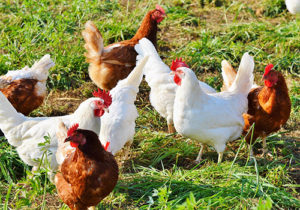In the daily management process in summer, managers should construct effective management and control mechanisms and management measures for specific problems to maintain the stability and effectiveness of the feeding management process.
1. Add insulation equipment inside the farm. Inside the farm, the farmer must do a good job of greening, effectively reducing the impact of high temperatures on the house. The large amount of green plants can not only effectively reduce the adverse effects of heat radiation, but also absorb the exhaust gas to a certain extent to ensure the effective purification of the air in the chicken farm, thereby optimizing the overall breeding environment.
In addition, insulation should be added to ensure that sunlight does not directly shine into the house.
2. In the process of breeding, additional equipment for water spray cooling should be added, and the density of breeding in the chicken battery cages should be reduced to some extent.
In the summer, be sure to supply fresh cold water to the flock, especially at noon in summer. In areas where the temperature is maintained above 35 degrees Celsius, the farmer is required to spray cold water every two hours, use atomization measures to reduce the temperature of the house, and focus on controlling the stocking density. In the summer, cage chickens are effectively managed to ensure about 10 per square meter.

3. To strengthen ventilation in the summer, open the doors and windows of the house in time to ventilate and ventilate, ensure maximum air circulation, ensure the oxygen demand of the flock, and set ventilation fans for individual houses to effectively reduce the temperature of the house.
4. To effectively adjust the feeding time during the chicken raising process in summer, especially in summer, it is necessary to ensure that the feeding frequency is controlled in the management mode of less feeding and feeding, ensuring concentrated feeding at low temperature every day, and opening in the morning and evening. Feed once after the lamp and before turning off the light.
5. In the process of raising chickens, it is necessary to pay full attention to the stress response of the flocks, especially in the high temperature summer, to ensure the quiet inside the house, to avoid cats and dogs entering the house, but also to concentrate on anti-rat and bird-proof work. Workers should also be slow to feed when feeding, so as not to cause frightening the flock.
6. During the hot summer egg laying management process, the farmer should carefully observe the daily changes of the laying hens, and record the feed intake, mental state and drinking water of the hens in time. And the amount of defecation is registered in time. Once abnormalities are found in the data and daily observations, it is necessary to carry out centralized treatment and comprehensive prevention and control for specific problems. For individual hens with more serious diseases, pollution-free treatment should be adopted to reduce the spread of the disease and thus avoid economic losses.